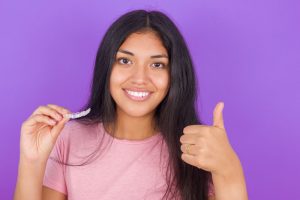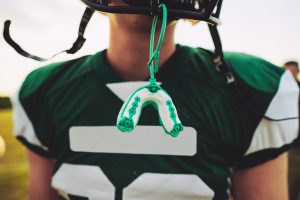

Do You Need a Custom Mouthguard?
Mouthguards have revolutionized dental protection across various activities, from high-intensity sports to a peaceful night’s sleep and everything in between. Yet many people remain unaware or unsure about their types, the significant benefits they offer, and where exactly to get them.
Our Staten Island dentists are here to help you better understand mouthguards and if you need one. Contact our dental office today by calling (718) 948-5111 to schedule an appointment.
What Are Mouthguards?
Mouthguards are protective devices worn in the mouth to help prevent injuries or damage to the teeth, gums, lips, and jaw during various activities. They’re typically made of a flexible, plastic-like material and are custom-fitted to the individual’s mouth or come in standard sizes.
Types of Mouthguards
When it comes to protecting your teeth from potential harm, there are several key types of mouthguards available. Each type serves a specific purpose and offers varying levels of protection:
- Store-Bought Mouthguards: These are readily available at most sporting goods stores or pharmacies. They come in two types: stock mouthguards and boil-and-bite mouthguards. Stock mouthguards are pre-formed and may not provide the best fit, while boil-and-bite mouthguards can be customized by softening them in hot water and molding them to your teeth. Although they offer some level of protection, they may not provide the same level of comfort and effectiveness as custom-made ones.
- Custom-Made Mouthguards: Considered the gold standard for mouth protection, custom-made mouthguards are fabricated by dental professionals based on impressions of your teeth. They ensure a precise fit and maximum comfort while providing optimal protection against impact during sports activities or teeth clenching/grinding.
- Snoring/Sleep Apnea Mouthguards: While primarily used for managing snoring and sleep apnea symptoms, these mouthguards can also help protect your teeth from grinding during sleep. They function by repositioning the jaw slightly forward to open the airway, allowing for improved airflow and reducing snoring or sleep apnea episodes. Similar to custom-made mouthguards, these devices are designed specifically for each individual and should be obtained through a dentist specializing in sleep dentistry.
The Science Behind Custom-Made Mouthguards
Custom-made mouthguards are often touted as the most effective option for protecting teeth during physical activities or managing certain dental conditions. But what makes them superior to store-bought alternatives?
- Custom-made mouthguards are designed based on detailed impressions of your teeth, ensuring an exact fit. This precise fit allows them to distribute impact forces more evenly and effectively than stock or boil-and-bite options. By evenly distributing force, they help minimize the risk of tooth fractures, dislodgement, or soft tissue injuries. Additionally, their close adaptation to your dentition provides enhanced comfort, allowing for extended wear without discomfort or interference with speech and breathing.
- Another important aspect is the material used to construct custom-made mouthguards. They’re typically made from more durable and resilient materials than store-bought options. These materials offer better shock absorption properties, absorbing and dispersing forces upon impact. This helps reduce the likelihood of dental injuries such as chipped or broken teeth.
- These mouthguards can be customized to address specific dental conditions. For example, individuals with braces or dental implants can have their mouthguards designed to accommodate these orthodontic appliances while still providing adequate protection. This customization ensures that every tooth is properly shielded, regardless of its position or alignment.
Imagine a soccer player wearing a poorly fitted store-bought mouthguard during a game. In an intense moment of play, an accidental elbow strike directly impacts their jaw. The ill-fitting guard fails to evenly distribute the force, resulting in a fractured tooth and potential soft tissue damage. Now consider the same scenario with a properly fitted custom-made mouthguard. The even distribution of force minimizes the impact on any single tooth, reducing the risk of injury and providing superior protection.
Mouthguard Uses
Mouthguards serve various purposes and offer an array of benefits depending on their specific use. Uses include:
- Athletics and Contact Sports: One of the most well-known use cases for mouthguards is in athletic activities, particularly contact sports such as football, boxing, hockey, and martial arts. These high-impact sports pose a significant risk of dental injuries due to collisions, falls, or blows to the face. mouthguards act as shock absorbers, distributing the force of impact across a larger area, reducing the likelihood of tooth fractures, chipped teeth, or even complete tooth loss. They provide a protective barrier between the upper and lower teeth and also help prevent injuries to the lips, tongue, jaw, and cheeks.
- Teeth Grinding (Bruxism): Many people unknowingly grind or clench their teeth during sleep, leading to numerous dental problems and discomfort. A mouthguard designed specifically for teeth grinding provides a cushioning barrier between your upper and lower teeth, minimizing the damage caused by grinding forces. By preventing tooth wear, jaw pain, headaches, and broken dental restorations, these mouthguards contribute to improved oral health and overall well-being.
- Snoring and Sleep Apnea: For those struggling with snoring or sleep apnea symptoms, specialized mouthguards can offer significant relief. These custom-fit devices work by gently repositioning the jaw to prevent partial airway collapse and keep the air passage open during sleep. By promoting proper airflow, they effectively reduce snoring intensity and frequency while providing potential relief from sleep apnea symptoms.
- Temporomandibular Joint (TMJ) Disorder: TMJ disorder often causes jaw pain, muscle tension, headaches, and clicking or popping sounds when opening or closing the mouth. Custom-made mouthguards are frequently prescribed as part of the treatment plan for TMJ disorders. They help alleviate symptoms by reducing pressure on the jaw joint, promoting relaxation of facial muscles, and providing a cushioning effect that minimizes excessive strain on the jaw.
Dentist-Made vs. Store-Bought Mouthguards
Ultimately, choosing between a dentist-made mouthguard and a store-bought one depends on personal preference, budget, and the level of protection required. If you participate in high-impact sports or have specific dental concerns, investing in a dentist-made guard might be worth considering for long-term oral health.
Dentist-Made Mouthguards
Dentist-made mouthguards have several advantages. Firstly, they offer a custom fit that ensures optimal comfort and protection. The dentist takes impressions of your teeth to create a mold that perfectly matches your dental structure. This personalized fit reduces the risk of injury and provides greater stability during physical activity.
Another advantage is the superior quality and durability of dentist-made guards. They are made with high-quality materials and are designed to withstand rigorous use. Additionally, some dentist-made guards can be adjusted to accommodate changes in tooth positions or bite alignment over time.
Store-Bought Mouthguards

Schedule Your Mouthguard Appointment Today!
Do you need a custom-made mouthguard? Let our Staten Island dentists create your new mouthguard to protect your teeth today. Contact our dental practice today by calling (718) 948-5111 to get your appointment scheduled.


